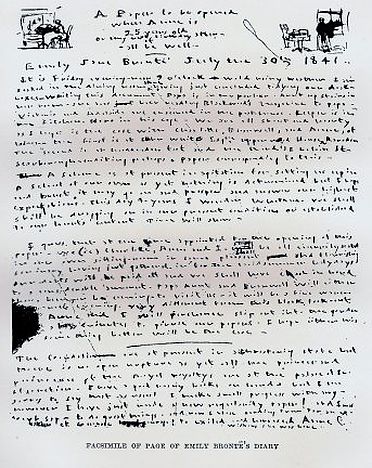“How little we know what we are
How less what we may be”
These words were written by Anne in a letter for Emily’s birthday on July 30th, 1841– 174 years ago. Back then, she was working for the Robinsons and on her sister’s birthday she was far from her and from the Parsonage. In spite of the distance, the two sisters found a way to meet each other through a few notes on a paper. The pact was, in fact, that they would write on that same day a few lines meant to be read four years later, for the purpose of observing how their lives would change by 1845.Emily’s future perspectives are hopes of happiness for her family:
“I guess that at the time appointed for the opening of this paper we (i.e.) Charlotte, Anne, and I, shall be all merrily seated in our own sitting-room in some pleasant and flourishing seminary, having just gathered in for the midsummer ladyday. Our debts will be paid off, and we shall have cash in hand to a considerable amount. Papa, aunt, and Branwell will either have been or be coming to visit us. It will be a fine warm, summer evening, very different from this bleak look-out, and Anne and I will perchance slip out into the garden for a few minutes to peruse our papers. I hope either this or something better will be the case.”

In this letter, she also writes about a professional project: the three sisters were planning to open their own school, hoping to achieve autonomy and financial stability. For the project, Charlotte and Emily had to pay a high price and went to Brussels in order to receive a good education on the Continent that would give great value to their own future activity. Emily, wasn’t probably the most suitable candidate for such a long stay abroad, but in those days Anne had a steady job and giving it up would have meant becoming a burden on the family finances.
Eventually, Emily and Charlotte left England but life doesn’t always go the way you planned it. As a matter of fact, Emily stayed in Brussels for just one year– when she went back to Haworth for the funerals of Aunt Branwell, she decided not to go back to Belgium anymore. On the contrary Charlotte stayed one year more, and returned to the Parsonage in 1844. Certainly it was not easy for them to stay away from home.
Time went by, and four years later- it was the 30th July 1845, Emily’s predictions of July 1841 were but an old memory. As promised, the time had come to open the papers, read the old notes and write some new ones. This is what we find out from her words:
“[…] I am twenty seven years old today–this morning Anne and I opened the papers we wrote 4 years since on my twenty third birthday–this paper we intend, if all be well, to open on my 30th three years hence in 1848–since the 1841 paper, the following events have taken place:[…] last summer the school scheme was revived in full vigor–We had prospectuses printed, despatched letters to all aquaintances imparting our plans and did our little all–but it was found no go–now I don’t desire a school at all and none of us have any great longing for it. We have cash enough for our present wants, with a prospect of accumulation. […] I am quite contented for myself: not as idle as formerly, altogether as hearty and having learnt to make the most of the present and long for the future with the fidgetiness that I cannot do all I wish; seldom or ever troubled with nothing to do, and merely desiring that everybody could be as comfortable as myself and as undesponding and then we should have a very tolerable world of it.”
So Anne and Emily kept their promise and opened the papers four years later. What had changed in their lives? Even if Emily doesn’t mention it, we know that sadly Aunt Branwell was gone and she wouldn’t be able to be with them as Emily wished. The project about the school, despite the sisters’ diligence and strain, had failed, and moreover, apparently they were not interested in it anymore.
It seems that, in those last four years, Emily learnt the importance of living in the present, instead of worrying about an uncertain future. Though she looks positive, when she talks about longing “for the future with the fidgetiness that I cannot do all I wish” we can clearly recognise her true soul – that reserved, complex and far from being confident attitude, that typical trait of hers, which makes her unique, and which we have always loved.
These are the last lines of Emily’s paper:
“I must hurry off now to my turning and ironing. I have plenty of work on hands, and writing, and am altogether full of business. With best wishes for the whole house till 1848, July 30th and as much longer as may be, – I conclude. E J Brontë”.
Unfortunately that of 1848 was the last birthday Emily celebrated, and we have not found any birthday-notes of that year.
Emily was just amazing! If you love her too, here are some great articles you can’t miss: “Thank God I’m Not You!”- Emily and Branwell’s relationship in To Walk Invisible, Ann Dinsdale reading Wuthering Heights by Emily Brontë, Wuthering Heights and Eclipse: the Thousand Lives of Emily Brontë’s Novel, Il pensiero religioso di una poetessa inglese del secolo XIX. Emilia Giovanna Brontë, Italian Essay on Emily Brontë’s Religious Thought: A Review.
Selene



